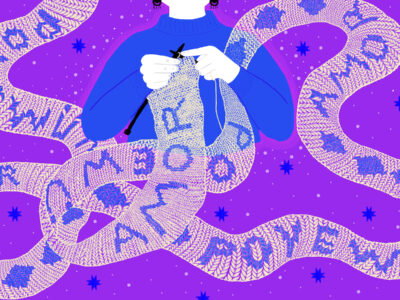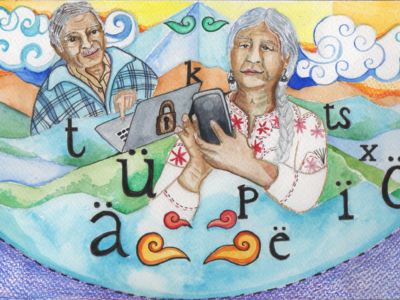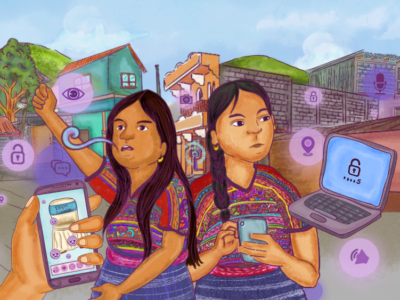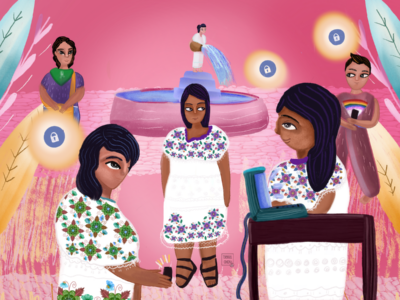Stories about Languages from January, 2023
Learning from Mapuche teachings of “poyewvn” to counter discrimination online
Elisa Loncon, Mapuche women, activist and scholar, positioned Mapudungun in institutional spaces during her time as president of the Constitutional Convention in Chile. Her strategy inspires ideas to safeguard linguistic diversity online
Ayuujk-amïxän: Imagining digital security strategies from listening to the elders
Tajëëw goes beyond the digital security view commonly held by the youth, by involving the experience of the elders to ensure security for Mixe communication and linguistic revitalization in the digital world
Facebook and privacy in El Carrizal, a Men Diiste community in Oaxaca
What is lost when the diversity of languages in the world do not find a safe space on digital platforms? Can we create digital security strategies that recognize and leverage linguistic diversity online?
Chajinem pa k’amaya’l: Supporting Maya Kaqchikel women when they face online harassment
"We seek to support and share based on friendship and sisterhood, we share various forms of self-care and collective care against harassment and gender violence"
Igbo Wikimedians: Digital safety challenges for activists preserving their language through open knowledge
As a part of the project "Digital Security + Language", Tochi Precious Friday, Igbo language activist speaks with fellow Wikimedians about their digital safety practices and learns that little to no digital resources are available in their language.
Digital (in)security: The experience of Yucatec Mayan and LGBTTIQ+ activists
Reducing violence and digital insecurity requires he creation of audiovisual materials in Yucatec Maya that disseminate information on digital security measures and knowing what to do in the case of a violent incident.
How the COVID-19 pandemic drove more Tharu speakers online, leading to more online vulnerability
As a part of the project "Digital Security + Language", Sanjib Chaudhary, Eastern Tharu language activist in Nepal, analyzed the move by speakers of Eastern Tharu to online spaces during the pandemic and the relationship with digital safety.
कोविड—१९ महामारीके बखत नेपालमे पूर्वैया थारू भसाके हाइबरिड ढङके परचार–परसार
ओनङ त बेसी सहभागीसब डिजिटल सुरक्छाके बारेमे सचेत नैछै। ओकरौके अनलाइनमे अंग्रेजीमे पाबैबला डिजिटल सुरक्छाके टुलकिटके बारमे सेहो ने थाह छै या ओकरौके ओइ स्रोतमे पहौच नै छै कथिले त कोनो स्रोत ओकरौके भसामे उपलब्ध नै छै। महज सहजकर्तासब निस्चित करैछै कि बैठक या अन्तरकिर्या सुरक्छित छै। ओकरौके पासवर्ड ककरो ने दैछै या बैठक सन्चालन करैले सुरक्छित इन्टरनेट मातरे परयोग करैछै।
Digital safety of native Odia speakers: A socio-economic overview
"To create a truly inclusive and equitable digital world, it is imperative that the deep-rooted socioeconomic and digital oppressions of several marginalized groups in Odisha are abolished."
Raising awareness about digital security among Dagbani language activists
Sadik Shahadu spoke to fellow Dagbani Wikimedians to listen to their perspectives on digital security. This article is part of the participatory research project "Digital Security + Languages"
Dagbani Wikimedians ban be Ghana Pohim Zuɣu Maŋgubu sochibisi shɛli bɛ ni yɛn kpuɣi ka tooi duhiri bɛ balli yuli.
Yɛltɔɣa yini shɛli din daa yi polo saha shɛli n mini ba daalizama puuni wuhiya ni bi pam pun mi pɔhim zuɣu maŋ gubu yɛltɔɣa amaa ka leei bi mi di anfaani nima bee tuma niɛn' shɛŋa bin ni tooi zaŋ gu' bi maŋa pɔhim zuɣu.
Poor internet access in Kichwa territory affects access to information about digital security
How does poor internet connectivity in rural Ecuador affect Kichwa communities' access to information, especially about digital security? Kichwa speaker Alliwa Pazmiño explores that question.
Kichwa llaktapi imashinatak Internetman yaykunakun
Zirmapi imashinatak kamarinamantaka mana tukuykuna llaktakunamanta yachanchu, ashtawanka chaykunamanta willaykuna mana chayakpi kan. Wakinkunaka hillaykunamanta, zirma pankakunamantaka asha asha paykunamantallatak yachakunkapak kallarishka, shinapash, ashalla yachan nishka.










